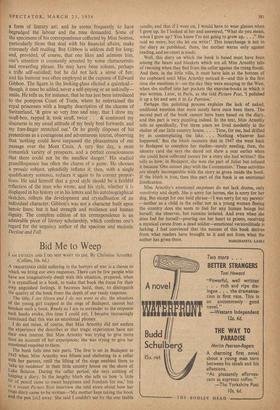Bid Me to Weep
I AM FIFTEEN AND I DO NOT WANT TO DIE. By Christine Arnothy. (Collins, 10s. 6d.) A FRIGHTENED child suffering in the horrors of war is a theme to which we bring our own responses. There can be few people who have not imaginatively dwelt with this situation, prepared, when it is crystallised in a book, to make that book the focus for their own anguished feelings. It becomes hard, then, to distinguish the quality of the book from the depth of our ready response.
The title, 1 am fifteen and 1 do not want to die, the situation of the young girl trapped in the siege of Budapest, cannot but betoken such a book. Ready as I am to surrender to the response such books evoke, this time I could not. I became increasingly convinced that this was an emotional phoney.
I do not mean, of course, that Miss Arnothy did not, endure the experience she describes or that tragic experiences have not their own interest. But Miss Arnothy was trying to give more Than an account of her experiences; she was trying to give her emotional response to them.
The book falls into two parts. The first is set in Budapest in 1945 when Miss Arnothy was fifteen and sheltering in a cellar with her parents, until the lifting of the siege enabled them to 'take up residence' in their little country house on the shore of Lake Balaton. During the cellar period, she says nothing of ,keeping a diary. In the lengthy blurb she tells us how 'a little hit of pencil came to mean happiness and freedom for me,' but In a recent Picture Post interview she told more about how her siege.diary came to be written--'My mother kept taking the book and the pen [sic] away. She said I couldn't see by the one feeble candle, and that if I went on, I would have to wear, glasses when I grew up. So I looked at her and answered, "What do you mean, when I grow up? You know I'm not going to grow up. . . ." She said no more, but she let me write!' This interchange is not in the diary as published; there, the mother warns only against reading, and no retort is made.
Well, this diary on which the book is based must have been among the beans and blankets which are all Miss Arnothy tells of rescuing when they fled from the cellar against the rising floods. And then, in the little villa, it must have lain at the bottom of the cupboard until Miss Arnothy noticed it—and this is the first time she mentions it—on the day they were escaping to the West, when she stuffed into her pockets the exercise-books in which it was written. Later, in Paris, as she told Picture Post, 'I polished it up a bit and sent it to Le Parisien.'
Perhaps this polishing process explains the lack of naked, undiluted emotion that must surely have once been there. The second part of the book ,cannot have been based on the diary, and this part is very puzzling indeed. In the text, Miss Arnothy tells us specifically, Tor three years we lived modestly in the shelter of our little country house. . . . Time, for me, had drifted by in contemplating the lake. . . . Nothing whatever bad happened.' But the blurb recounts that in 1947 she went back to Budapest to complete her studies—surely needing, then, the identity card she says she dared not show a year earlier when she could have collected money for a story she had written? She tells us how, in Budapest, she won the part of Juliet but refused it because 'One cannot play with the Communists.' These activities are simply incompatible with the story as given inside the book. If the blurb is true, then this part of the book is an emotional falsification.
Miss Arnothy's emotional responses do not lack drama, only sensitivity and depth. She is sorry for horses, she is sorry for her dog. But except for one bald phrase-1 was sorry for my parents' —neither as a child in the cellar nor as a young woman fleeing the country does she seem to feel for any human beings but herself; she observes, but remains isolated. And even when sbe does feel for herself—pouring out her heart to priests, receiving a mystical caress from a dead soldier—emotional verisimilitude is lacking. I feel convinced that the success of this book derives from what readers have brought to it and not from what the


































 Previous page
Previous page